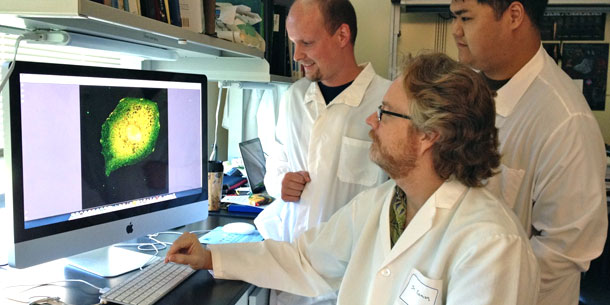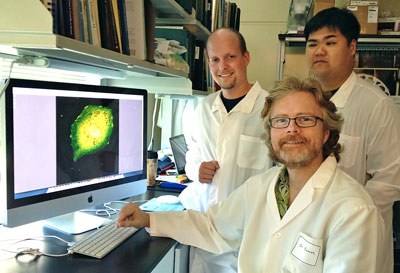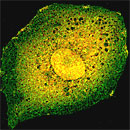

A protein that slows the growth and spread of ovarian cancer can surprisingly enhance tumor formation in kidney cells that carry a certain mutation, according to a new study from the University of Hawaiʻi Cancer Center that has implications for cancer treatment.
The H-Ras gene regulates cell division. A cancer-promoting mutation in the gene contributes to the development, proliferation and metastasis of tumors in many human malignancies.
The protein, called PEA-15, inhibits tumor cell proliferation and metastasis by opposing H-Ras signals.
While PEA-15 has shown promising potential for treating ovarian and breast cancer and as a marker of prolonged patient survival in ovarian cancer, it may also trigger tumor growth, suggesting caution in pursuing the use of PEA-15 as an anti-cancer therapeutic.
The new study—the first to report a pro-cancer growth effect of PEA-15—was published online November 21 in the journal Oncogene.

“Our findings reveal a surprising mechanism by which PEA-15 can enhance H-Ras driven transformation of cells, rather than stop it,” said corresponding author Joe W. Ramos, co-director of the UH Cancer Center’s Cancer Biology Program. PEA-15 accelerated the rate of tumor formation in mouse kidney epithelial cells containing a Ras mutation both in vitro and in vivo.
The difference relates to the signaling pathways active in a specific tumor cell, he explained.
“An interplay of factors determines the fate of a patient,” noted lead author Florian Sulzmaier, a doctoral candidate in the Department of Molecular Biosciences and Bioengineering. “PEA-15 might still be worth considering for treatment of certain cancers. However, care should be taken in tumor types that carry Ras mutations that could change the outcome of a therapy.”
The research team also included UH Mānoa research assistants Mohana Valmiki and Maisel Caliva, Assistant Professor Michelle L. Matter and colleagues at the Cancer Institute of New Jersey and Academic Medical Center, University of Amsterdam.
The study was supported by a grant from the National Institutes of Health National Cancer Institute and National Institute of General Medical Sciences and the Victoria S. and Bradley Geist Foundation.

